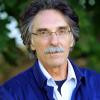
Contact Abraham
Mail Code PF
Abraham Ravett
Jerome Liebling Center 107
413.559.5492

Mail Code PF
Abraham Ravett
Jerome Liebling Center 107
413.559.5492
Abraham Ravett holds a B.F.A and M.F.A in filmmaking and photography and has been an independent filmmaker for the past thirty-five years. He was born in Poland and raised in Israel and the U.S.
Ravett has received grants for his work from the Massachusetts Cultural Council; National Foundation for Jewish Culture: Fund for Documentary Filmmaking; National Endowment for the Arts; The Massachusetts Council on the Arts and Humanities; The Japan Foundation; The LEF Foundation; and The Marion and Jasper Whiting Foundation; as well as a 1994 filmmaking fellowship from the John Simon Guggenheim Memorial Foundation.
His films have been screened internationally, including at several one-person shows at New York’s Museum of Modern Art. His work has won “Top Prize” at the Viennale 2000, Ann Arbor Film Festival, and Onion City Film/Video Festival. In 1999, he collaborated with dancer/choreographer Bill T. Jones on his solo performance "The Breathing Show." A retrospective of Ravett's films was shown at the 2014 Festival Film Dokumenter Yogyakarta, Indonesia.
This course will involve a detailed study of the Japanese cinema. It will highlight works in the dramatic narrative, documentary, and experimental traditions. The films screened will use the past to explore the meaning of the present, examine the relationships within families, investigate formal issues in cinematic construction, and attempt to articulate broader social issues within Japanese society. Class will meet once a week for two hours and fifty minutes plus additional time for second screenings. Participants will be asked to complete a series of papers plus a final project based on class discussions, film screenings, and assigned readings. Keywords:Japanese Cinema, filmmaking
This course teaches the basic skills of 16mm film production, including camera work, editing, animation, optical printing, and preparation for a finished work in film and video. We will explore multiple ways this spatial-temporal medium can shape our perceptions of the world and help narrate stories waiting to be told. Students will submit weekly written responses to theoretical and historical readings and to screenings of films and DVDs that represent a variety of aesthetic approaches to the moving image. There will be a series of filmmaking assignments culminating in a final project. The bulk of the work will be produced in 16mm format including animation, optical printing, plus a variety of ways to self-process film or create cameraless moving images. Keywords: filmmaking, analog, 16mm, film
"Certain people start with a documentary and arrive at fiction...others start with fiction and arrive at the documentary."-Jean Luc Godard This is an introductory course for students who would like to explore their interest in documentary practice. Through a combination of screenings, lectures, readings and technical workshops, we will explore a critical/historical overview of this genre and incorporate our knowledge and experience to produce individual or collaborative projects in a variety of "modes of representation." Projects need not be restricted to a particular medium; in fact, students will be encouraged to explore the ways in which film, video, photography and/or animation can be utilized together. Keywords:no- fiction, documentary